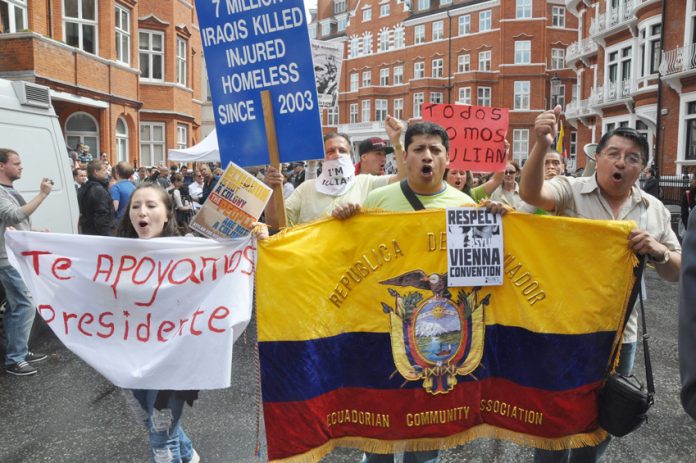ECUADOR has granted asylum to WikiLeaks founder Julian Assange because it believes he will be politically persecuted if extradited, Ecuadorian Foreign Minister Ricardo Patiño announced on Thursday.
The UK, meanwhile, has said it is disappointed by the decision and will not grant safe passage out of the country to Assange, who has been holed up inside Ecuador’s embassy in London for nearly two months.
‘Under our law, with Mr Assange having exhausted all options of appeal, the British authorities are under a binding obligation to extradite him to Sweden. We shall carry out that obligation. The Ecuadorian government’s decision this afternoon does not change that. We remain committed to a negotiated solution that allows us to carry out our obligations under the Extradition Act,’ said a statement from the British Foreign Office.
Patiño preceded his announcement with a lengthy argument against any British action against Ecuador’s embassy in London.
In remarks on Wednesday, he said the Ecuadorian government had received a written notice from British authorities that they would ‘assault’ the country’s embassy in London if Ecuadorian officials failed to hand over Assange to British authorities.
‘We are not a British colony,’ he said. ‘Those times are passed.’
The British government’s statement that it intends to honour its promise to send Assange to Sweden to face questioning on sex crimes charges, even if it means entering the premises, is an affront to international law, Patiño said.
The UK, in effect, is saying ‘we are going to savagely hit you depending on how you behave,’ the foreign minister said.
The British say one of their laws allows for it to enter the embassy and arrest Assange. Patiño cited a laundry list of international treaties and conventions that he said make it clear that it is illegal to enter another country’s embassy.
Asylum was granted to Assange after considering the ‘maximum seriousness’ of the matter, he said.
The foreign minister outlined 11 conclusions that Ecuador reached in reviewing the WikiLeaks founder’s asylum request.
In short, Ecuador found that Assange has a credible fear of persecution for his ideas and politics. The government described him as an activist for freedom of the press and freedom of expression who would be silenced if sent to Sweden, and possibly, the United States.
In the United States, there are no guarantees that Assange would receive a fair trial or that he wouldn’t be subject to a military or secret tribunal, Patiño said.
WikiLeaks, earlier on Thursday condemned Britain’s vow in a statement released early Thursday that it would enter the embassy, and called for Foreign Minister Hague’s resignation.
‘In a communication this morning to the government of Ecuador, the UK threatened to forcefully enter the Ecuadorian embassy in London and arrest Julian Assange.
‘The UK claims the power to do so under the Diplomatic and Consular Premises Act 1987.
‘This claim is without basis.
‘By midnight, two hours prior to the time of this announcement, the embassy had been surrounded by police, in a menacing show of force.
‘Any transgression against the sanctity of the embassy is a unilateral and shameful act, and a violation of the Vienna Convention, which protects embassies worldwide.
‘This threat is designed to preempt Ecuador’s imminent decision on whether it will grant Julian Assange political asylum, and to bully Ecuador into a decision that is agreeable to the United Kingdom and its allies.
‘WikiLeaks condemns in the strongest possible terms the UK’s resort to intimidation.
‘A threat of this nature is a hostile and extreme act, which is not proportionate to the circumstances, and an unprecedented assault on the rights of asylum seekers worldwide.
‘We draw attention to the fact that the United Nations General Assembly has unanimously declared in Resolution 2312 (1967) that “the grant of asylum. . . is a peaceful and humanitarian act and that, as such, it cannot be regarded as unfriendly by any other State.”
‘Pursuant to this resolution, a decision to grant asylum cannot be construed by another State as an unfriendly act. Neither can there be diplomatic consequences for granting asylum.
‘We remind the public that these extraordinary actions are being taken to detain a man who has not been charged with any crime in any country.
‘WikiLeaks joins the government of Ecuador in urging the UK to resolve this situation according to peaceful norms of conduct.
‘We further urge the UK government to show restraint, and to consider the dire ramifications of any violation of the elementary norms of international law.
‘We ask that the UK respect Ecuador’s sovereign right to deliver a decision of its own making on Julian Assange’s asylum bid.
‘Noting that Ecuador has called for emergency summits of OAS and UNASUR in response to this development, WikiLeaks asks those bodies to support Ecuador’s rights in this matter, and to oppose any attempts to coerce a decision.
‘We note with interest that this development coincides with the UK Secretary of State William Hague’s assumption of executive responsibilities during the vacation of the Prime Minister and Deputy Prime Minister.
‘Mr Hague’s department, the Foreign and Commonwealth Office, has overseen the negotiations to date with Ecuador in the matter of Mr Assange’s asylum bid.
‘If Mr Hague has, as would be expected, approved this decision, WikiLeaks calls for his immediate resignation.’
